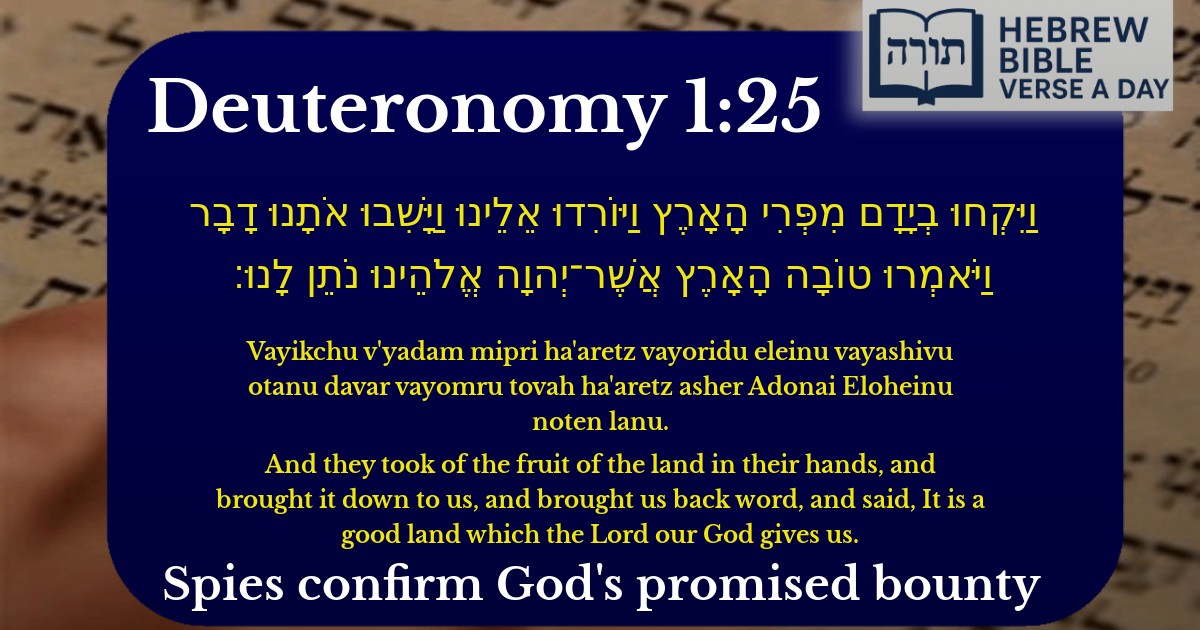Join Our Newsletter To Be Informed When New Videos Are Posted
Join the thousands of fellow Studends who rely on our videos to learn how to read the bible in Hebrew for free!
Hebrew Text
וַיִּקְחוּ בְיָדָם מִפְּרִי הָאָרֶץ וַיּוֹרִדוּ אֵלֵינוּ וַיָּשִׁבוּ אֹתָנוּ דָבָר וַיֹּאמְרוּ טוֹבָה הָאָרֶץ אֲשֶׁר־יְהוָה אֱלֹהֵינוּ נֹתֵן לָנוּ׃
English Translation
And they took of the fruit of the land in their hands, and brought it down to us, and brought us back word, and said, It is a good land which the Lord our God gives us.
Transliteration
Vayikchu v'yadam mipri ha'aretz vayoridu eleinu vayashivu otanu davar vayomru tovah ha'aretz asher Adonai Eloheinu noten lanu.
Hebrew Leining Text
וַיִּקְח֤וּ בְיָדָם֙ מִפְּרִ֣י הָאָ֔רֶץ וַיּוֹרִ֖דוּ אֵלֵ֑ינוּ וַיָּשִׁ֨בוּ אֹתָ֤נוּ דָבָר֙ וַיֹּ֣אמְר֔וּ טוֹבָ֣ה הָאָ֔רֶץ אֲשֶׁר־יְהֹוָ֥ה אֱלֹהֵ֖ינוּ נֹתֵ֥ן לָֽנוּ׃
וַיִּקְח֤וּ בְיָדָם֙ מִפְּרִ֣י הָאָ֔רֶץ וַיּוֹרִ֖דוּ אֵלֵ֑ינוּ וַיָּשִׁ֨בוּ אֹתָ֤נוּ דָבָר֙ וַיֹּ֣אמְר֔וּ טוֹבָ֣ה הָאָ֔רֶץ אֲשֶׁר־יְהֹוָ֥ה אֱלֹהֵ֖ינוּ נֹתֵ֥ן לָֽנוּ׃
🎵 Listen to leining
Parasha Commentary
📚 Talmud Citations
This verse is not quoted in the Talmud.


Context in the Torah
The verse (Devarim 1:25) describes the report of the twelve spies sent by Moshe to scout the Land of Israel. While the majority of the spies later delivered a negative report, this verse captures their initial positive acknowledgment of the land's goodness, affirming that it was a gift from Hashem.
Rashi's Explanation
Rashi (Devarim 1:25) notes that the phrase "וַיֹּאמְרוּ טוֹבָה הָאָרֶץ" ("and they said, it is a good land") indicates that all twelve spies initially agreed on the land's exceptional quality. However, ten of them later contradicted this statement by spreading fear among Bnei Yisrael (Bamidbar 13:32). Rashi emphasizes that their initial words were truthful—the land was indeed good—but their later distortion of the truth led to severe consequences.
The Rambam's Perspective
The Rambam (Hilchot De'ot 2:6) teaches that speech must align with truth and proper intent. The spies' initial praise of the land was correct, but their subsequent fear-mongering demonstrated a failure in emunah (faith) and bitachon (trust in Hashem). This serves as a lesson in the importance of consistent integrity in speech and belief.
Midrashic Insights
Chassidic Interpretation
The Sfat Emet (Devarim 1:25) teaches that the spies' initial recognition of the land's goodness reflected a moment of clarity—seeing the land as a spiritual inheritance rather than merely a physical conquest. Their failure was in shifting focus from Divine promise to human limitations, leading to the tragic episode of the meraglim (spies).